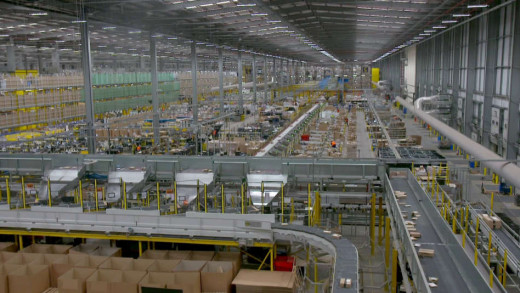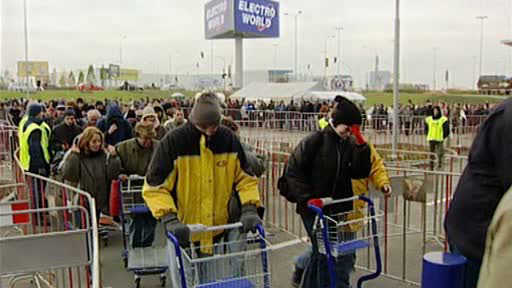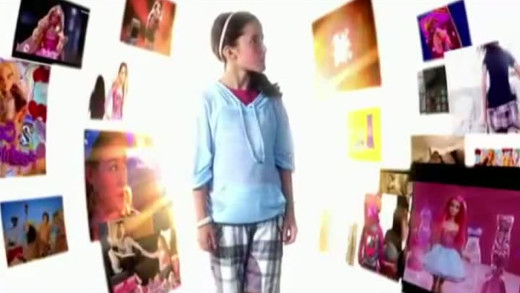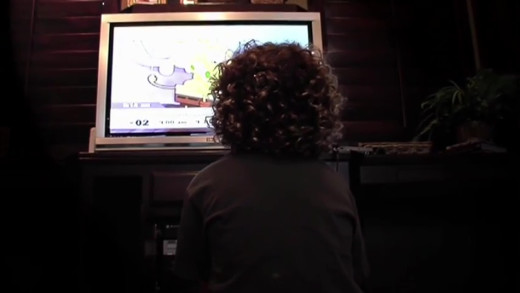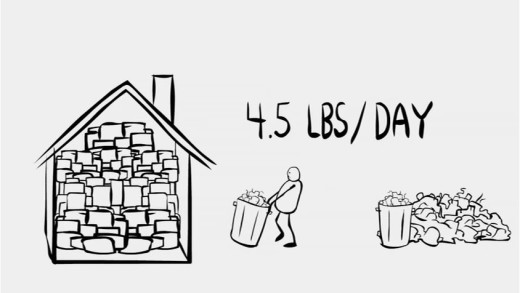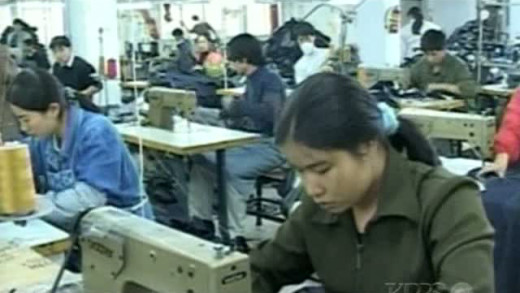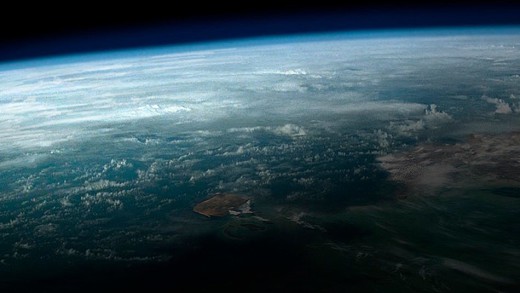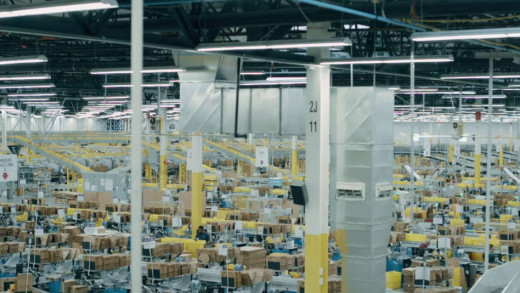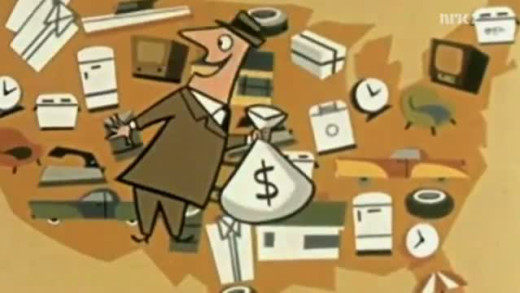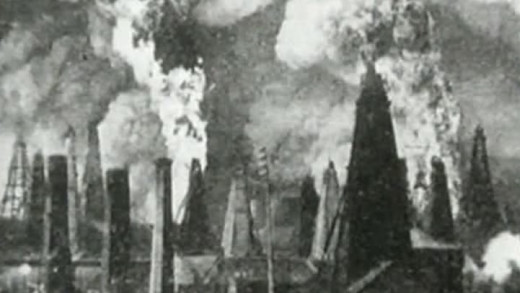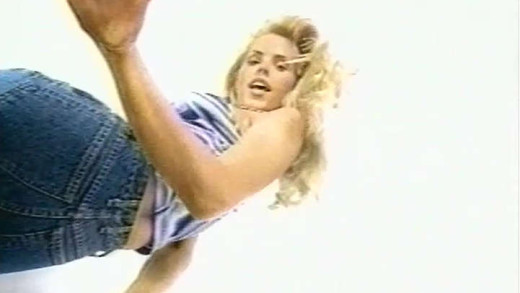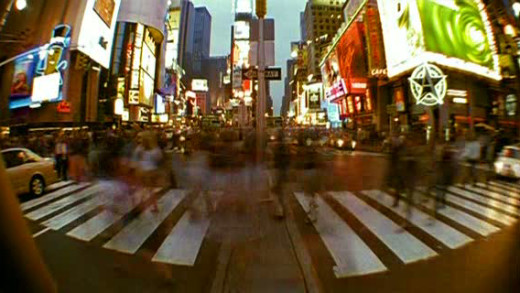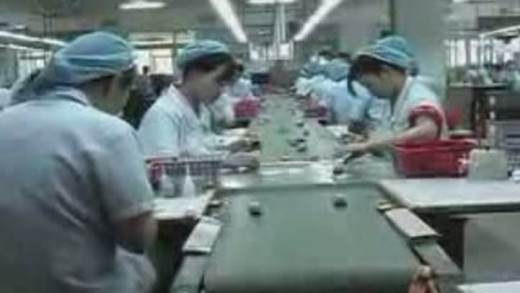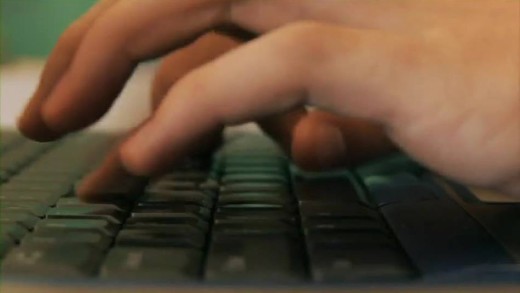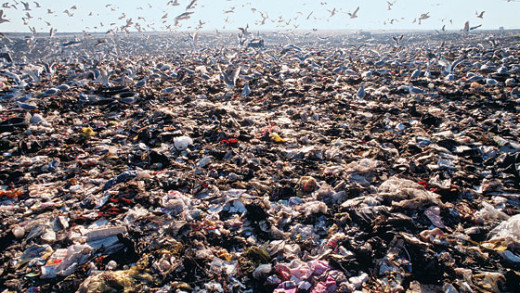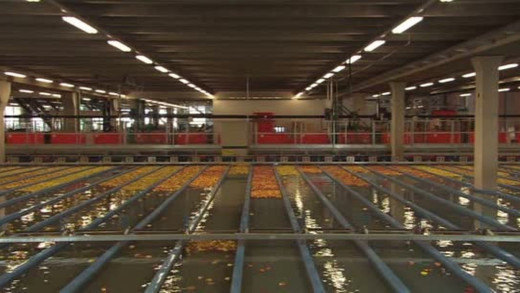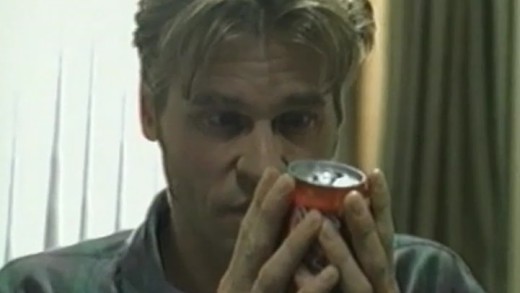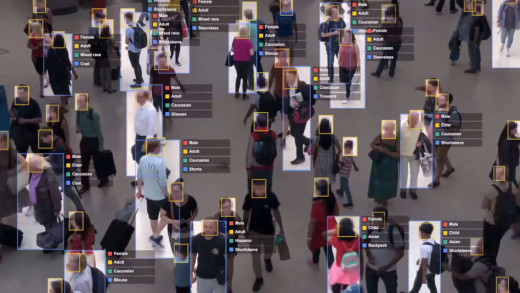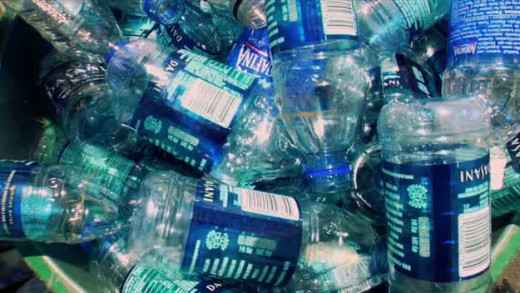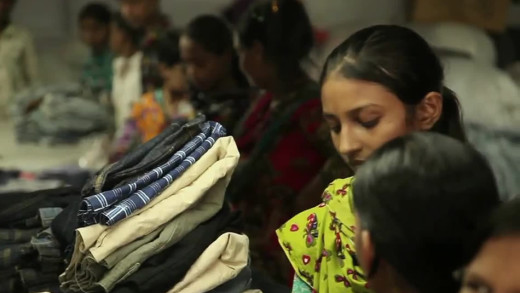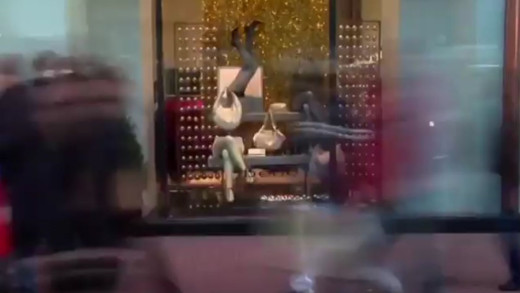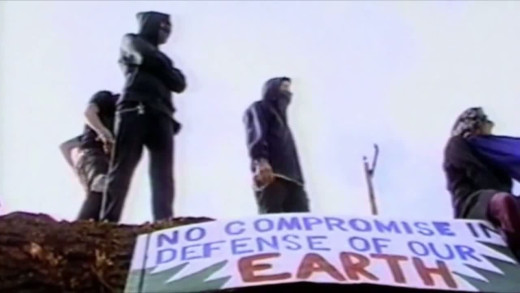In a quarter of a century, the Amazon corporation has propelled Jeff Bezos from 'online bookseller' to technology behemoth. He is the richest man on the planet, and the company he founded is one of the most powerful in the world. This documentary investigates Amazon's rise to corporate rein, revealing the problematic inside-operations that have the public tethered to its services. Former high-level insiders describe Amazon's obsessive data-gathering operations, that enable the company to use what it knows about us to shape not only the future of retail, but the workplace and technology in synergy. On both sides of the world, politicians and regulators are tardily beginning to question Amazon's power. But can the public rein in this corporate empire and break its addiction before even more damage is done to the structure of society and the environment?
Two film students set out to explore the psychological and manipulative powers of consumerism by creating an extensive and pervasive advertising campaign for a fake hypermarket. The ads appear on radio, television, billboards; there is a promotional song, an internet site, ads in newspapers, magazines, and flyers with photos of fake Czech Dream products are distributed. Will people believe it and show up for the grand opening?
From tiny tots strutting bikini-clad bodies in beauty pageants to companies marketing itty-bitty thongs and padded bras directly to 9-year olds; images of ever-younger sexualised girls pervasively saturate the media landscape. Add to that: ever-younger boys with 24-7 access to hard-core internet porn and the situation permeates every aspect of their lives--from skate parks to the school bus. By the time they’re eighteen, 80 percent of boys are watching porn online. Then add to that smart phones and social networking websites, and kids can not only consume X-rated images, but can now also produce them. Sexting has become a Grade 7 right of passage. Sext Up Kids exposes how growing up in a hyper-sexualized culture hurts everyone. Teens and pre-teens show and tell what they are doing and why they are doing it. Psychologists and social researchers reveal startling new evidence, tracking how the pressure to be sexy is changing teen and sexual behaviour in alarming ways. Parents and educators struggle to help kids navigate puberty in a world where the line between pop culture and porn culture is increasingly blurred. For every parent who thinks, “that’s not my son or daughter,” Sext Up Kids is your wake up call.
The huge and complex problems of today often instil doubt and fear that everything is futile. Yet by analysing how the power of media, schooling and parenting have moulded us, #ReGENERATION helps us start to comprehend what we must change—both as a generation and as a culture. We see how the average family spends at least four hours a day in front of the TV. Internet and video games are not included in this figure. So guess what is shaping us? This film examines the corporate forces that deeply influence all of us, but particularly the young, providing insights into how the politics of apathy is perpetuated, and how we can turn this around into activism, if and when we are willing.
From its extraction through sale, use and disposal, all the stuff in our lives affects communities at home and abroad, yet most of this is hidden from view. This is by design. The Story of Stuff serves as an introduction to the underside of the current world of mass production and consumption, exposing the connections between a huge number of environmental and social issues -- shedding the light on the hidden processes behind our modern world. How can we create a more sustainable and just economy?
Shot clandestinely at a blue jeans factory in southern China where a young girl and her friends work around the clock for pennies a day, China Blue reveals what international retail companies don't want us to see: how the clothes are actually made...
The Planet is a stylised observational video commentary that brings together an overview of the many global changes set about by industrial civilisation. Viewed through the myriad connections between consumerism and the false notion of a perpetually expanding economy on a finite planet, the film peers across the globe to reveal systemic exploitation; species extinction driven by industrial agriculture, logging, mining, manufacturing, pollution, the age of oil and plastic, etc; climate change; carrying capacity and population growth; while also positing that we—as in you and me—can do something, anything, to stop the destruction.
There are billions of people increasingly glued to 'smartphones' and consumed by the seemingly endless spectacle of 'social media.' But why? Reporter Hilary Andersson seeks to answer this question by tracking down insiders who reveal how social-media companies have deliberately developed habit-forming technology to get people addicted. Former Facebook manager, Sandy Parakilas, tells us the "goal is to addict you and then sell your time." Likewise, Leah Pearlman, the co-creator of the renowned 'Like' button, warns of the dangers of social-media addiction. Through these voices, and many others, Andersson shows how behavioural science is profoundly used by tech companies to keep people endlessly checking their phones, to the end of huge profits.
By examining the modern culture of industrial civilisation and the persistent widespread violence and environmental exploitation it requires, END:CIV details the resulting epidemic of poisoned landscapes and shell-shocked nations, while further delving into the history of resistance and the prospect of fighting back against such abuse. Detailed is an overview of the environmental movement analogous with the historical whitewashings of the supposedly 'pacifist' social struggles in India with Gandhi and Martin Luther King in the United States; the rise of greenwashing and the fallacy that all can be repaired by personal consumer choices. Based in part on 'Endgame,' the best-selling book by Derrick Jensen, END:CIV asks: If your homeland was invaded by aliens who cut down the trees, poisoned the water, the air, contaminated the food supply and occupied the land by force, would you fight back?
What Would Jesus Buy is an examination of consumerism with a specific focus on Christmas in America. The film follows culture jamming outfit 'Reverend Billy' from the Church of Stop Shopping and the gospel choir which embark on a cross-country mission to "save Christmas from the Shopocalypse". Also discussed on the way are related issues such as the role sweatshops play in America's 'Big-Box' shopping culture. From the humble beginnings of preaching at his portable pulpit on New York City subways, to having a 'congregation' of thousands, Bill Talen (Rev. Billy) has inspired not just a 'church', but a national culture jamming movement...
HyperNormalisation wades through the culmination of forces that have driven this culture into mass uncertainty, confusion, spectacle and simulation. Where events keep happening that seem crazy, inexplicable and out of control—from Donald Trump to Brexit, to the War in Syria, mass immigration, extreme disparity in wealth, and increasing bomb attacks in the West—this film shows a basis to not only why these chaotic events are happening, but also why we, as well as those in power, may not understand them. We have retreated into a simplified, and often completely fake version of the world. And because it is reflected all around us, ubiquitous, we accept it as normal. This epic narrative of how we got here spans over 40 years, with an extraordinary cast of characters—the Assad dynasty, Donald Trump, Henry Kissinger, Patti Smith, early performance artists in New York, President Putin, Japanese gangsters, suicide bombers, Colonel Gaddafi and the Internet. HyperNormalisation weaves these historical narratives back together to show how today's fake and hollow world was created and is sustained. This shows that a new kind of resistance must be imagined and actioned, as well as an unprecedented reawakening in a time where it matters like never before.
Jeff Bezos is not only one of the richest men in the world, the vast corporate empire he has built is unprecedented in the history of capitalism. The corporate power to shape everything from the future of work to the future of commerce to the future of technology is unrivaled. The company's reach into the everyday life of citizens, manipulating their experience and extracting extreme profits, is profound. It's extraction of labour and giant streams of data is cataclysmic. It's reach into culture, media, law enforcement, even a deal with the CIA, is indicative. But despite all of this, the company contradictorily claims it is "just a speck." As regulators around the world tardily start to consider the global impact of Amazon and how to rein in its extreme corporate power, filmmakers Anya Bourg and James Jacoby reveal how Bezos's plan to build one of the most influential economic and cultural forces in the world has already transpired, and how the job of reining in this pervasive corporate power will be testing in the extreme.
The Light Bulb Conspiracy investigates the history of Planned Obsolescence--the deliberate shortening of product life span to guarantee consumer demand--by charting its beginnings in the 1920s with a cartel set up expressly to limit the life span of light bulbs, right up to present-day products involving cutting edge electronics such as the iPod. The film travels to France, Germany, Spain and the US to find witnesses of a business practice which has become the basis of the modern economy, and brings back graphic pictures from Ghana where discarded electronics are piling up in huge cemeteries for electronic waste, causing intense environmental destruction and health problems.
The Prize: The Epic Quest for Oil, Money, and Power is an 8-part series based on Daniel Yergin's book by the same name, that captures the panoramic history of the largest industry in the world and traces it's changing face over the decades. Each episode in the series focuses on an era of oil, from beginning to today; while examining the connections and ramifications of an industry that literally transformed global political and economic landscapes--while continuing to make its mark...
Everybody who has survived adolescence knows what a scary, tumultuous, exciting time it is. But if we use memories of our experiences to guide our understanding of what today's girls are living through, we make a serious mistake. Girls are living in a new world. Reviving Ophelia is a call from Dr. Mary Pipher, a psychologist who has worked with teenagers for more than a decade. She finds that in spite of the women's movement, which has empowered adult women in some ways, teenage girls today are having a harder time than ever before because of higher levels of violence and sexism in the culture. The current crises of adolescence--frequent suicide attempts, dropping out of school and running away from home, teenage pregnancies in unprecedented numbers, and an epidemic of eating disorders--are caused not so much by "dysfunctional families" or incorrect messages from parents as by our media-saturated, image-obsessed culture.
Featuring George Bush's famous "go-shopping-speech" calling for a war against terrorism that deters the nation from the fear of consumption; Castro responding with hymns to the anti-consumerist, advertising-free island of Cuba; Bill Gates and Steve Ballmer preaching that the computer will give us peace on earth, and "bring people together rather than isolate them"; while Adbuster Kalle Lasn warns that advertising pollutes us mentally, that over-consumption is unsustainable, that we are running out of oil and this will cause a global economic collapse...
Santa's Workshop -- Inside China's Slave Labour Toy Factories shows the long working hours, low wages, and the dangerous work and conditions inside these toy factories. Workers who protest or try to organise unions risk imprisonment. Low labour costs and government protections for multinational corporations attract more and more companies to China. Figureheads blame the Chinese suppliers, but they say in the same sentence that increasing competition gives them no option. What and whom to believe?
One generation from now, most people in the United States will have spent more time in the virtual world than in the natural world. New media technologies have changed lives in countless ways. Streams of information now appears in a click. Overseas friends are contactable in an instant. Engulfing video games and streams of endless entertainment to stimulate the senses, dazzle the mind and pander to the acculturated desire to be in control. Even grandma loves Wii. But what are people missing when they're behind screens? How is it already impacting our children, our society, and the planet? At a time when people are at screens more than they are outside, Play Again explores the challenge in dealing with the addiction and returning to the real world...
Fuelled by popular personalities on Instagram, YouTube and Snapchat, cosmetic surgery is pushing further into the mainstream. Huge numbers of people, predominantly young women, are choosing to alter their appearance forever as though it's as simple as buying a new set of clothes. Social-media "influencers" get free procedures in exchange for promoting certain doctors or agencies or products to their audiences. Going on the numbers alone, audiences seem to respond to this blatantly cacophonous advertising, following their social media stars closely, and taking out huge personal loans to get surgery and "keep up with the Kardashians." Doctors offering the surgery are even becoming media stars themselves, and it's redefining the meaning of doctor/patient relations. Underpinning this entire industry, is a business model of targeting women who can barely afford procedures by selling the dream of a "new you." Social-media laps it up, and the cycle repeats. But as this investigation shows, when things go wrong, the physical and financial costs are devastating. Real doctors who are left to pick up the pieces, are warning that the booming industry is creating a dangerous legacy, and not just to the concept of beauty.
Eat a takeaway meal, buy a pair of shoes, or read a newspaper and you're soon faced with a bewildering amount of rubbish. Over the past 30 years worldwide garbage output has exploded, doubling in the United States alone. So how did there come to be this much waste, and where does it all go? By excavating the history of rubbish handling from the 1800s -- an era of garbage-grazing urban hogs and dump-dwelling rag pickers -- to the present, with mass consumer culture, modern industrial production and the disposable American lifestyle, The Hidden Life Of Garbage documents the politics of recycling, greenwashing and the export of trash to the third world as part exposé, part social commentary...
Welcome to the world of industrial food production and high-tech factory farming. Set to the pace of conveyor belts, immense machines, surreal landscapes and bizarre sounds, Our Daily Bread takes an inside look at the industrial environment that mass-produces today's food. Made entirely of visuals, without commentary, this film provides a raw view of the strange realities of industrial food production, which isn't always easy to digest...
Behind the Screens explores how Hollywood movies have largely become vehicles for the ulterior motives of advertising and marketing by the studios and media owners, rather than genuine storytelling or simple entertainment in their own right. By showing examples from popular movies such as Wayne's World, Forrest Gump, The Lion King, Summer of Sam, and Toy Story, this documentary demonstrates how this trend toward hypercommercialism—through product placement, tie-ins, merchandising and cross-promotions—comes to define the modern movie. What are the problems with this, as well as the cultural and social impacts? Combined with analysis from film scholars, critics, political economists, and an Oscar-nominated screenwriter, Behind the Screens presents accessible arguments to these questions.
In 2018, Professor Shoshana Zuboff published The Age of Surveillance Capitalism, a monumental book about the new global economy, where the biggest technology corporations extract, manipulate, and trade our personal information, data about our lives, and data about our personalities, on a scale never before possible. How did this happen? In The Big Data Robbery, Zuboff starts with the volatile dot-com boom and bust of the late 1990s and 2000s. How did Google, a company created during that time, survive the bursting of the Internet bubble? Founders Larry Page and Sergey Brin discover that the "residual data" that people leave behind in their searches on the Internet is very precious and tradable, and begin as one corporation of many, the Big Data Robbery, extracting and building huge datasets about people. Zuboff takes the lid off Google and Facebook to reveal a merciless form of capitalism in which the citizen itself now serves as a raw material.
Tapped shows the hidden affects of the bottled water industry by documenting the impacts to the environment from plastic bottles, pollution from production, right down to the impact on the communities, land and people from which the water is taken...
In November 2012, yet another incident at a textiles factory in Bangladesh killed at least 112 people. Walmart’s brand shorts were among the clothing found in the charred remains. Walmart blamed its supplier, saying the order had been sub-contracted without its permission. With this example among the many, Made in Bangladesh illustrates the complex organisation of corporate obfuscation--the industries that continue to drive sweat shops, slave labour and child labour under a very clever hall of mirrors...
Are we willfully trashing the planet in the pursuit of endless things? What's the source of the frenetic consumer energy and desire? In a fast-paced tour of the ecological and psychological terrain of consumer culture, Shop 'Til You Drop challenges the viewer to confront these questions head-on. Taking aim at the high-stress, high-octane pace of materialism, the film moves beneath the seductive surfaces of the commercial world to show how the other side of consumerism is depletion--the slow, steady erosion of not only the natural world, but basic human and community values. Shop 'Til You Drop contextualises the turbulence of this moment, providing an unflinching critique of the limits of consumerism and the so-called "pursuit of happiness."
The suburbs are an unsustainable way of living. Developed in the post-war era of cheap oil and the car, the lifestyle was spruiked as the 'escape' from the industrial city to a more pastoral and rural way of life. However, they quickly evolved into a place that had neither of these qualities. Now, part of the problem of getting out of the suburban mentality is that a generation has grown up believing it to be a 'normal way of life' and even a life of entitlement, something which they will not give up without a fight...
People from industrial civilisation are fast to defend it, saying that they depend on this way of life for survival. It's an addiction. But what if civilisation is the very thing that is killing us and everyone else around? How could we survive then? The Fuck-It Point is about this pervasive disabling mindset of civilisation, its true cost, why and how we need to stop it from killing the planet, and why most people from civilisation don't want to do this. Will you do what is necessary to stop this culture from killing the planet?
